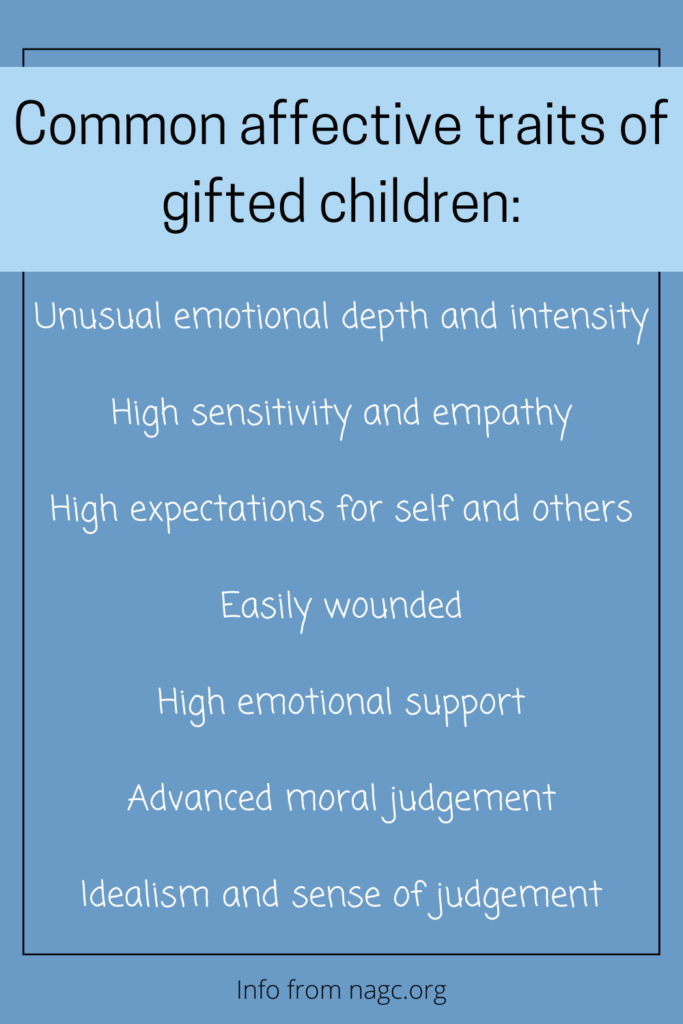Gifted Traits in Students: Affective
I am the mom of at least 2 gifted children – only 2 have been formally tested and one is showing similar traits. I am frequently asked “How did you know your boys were gifted?” by other caregivers. In this post, I will outline only just a few experiences of some of the affective gifted traits my boys exhibited that are common in the gifted. (Affective – think “feelings.”) This post just scratches the surface. Not all gifted people have the same traits – even within families!
Here is the list from the National Association of Gifted Children that I am pulling from for this post:

Heightened Self-awareness, Feeling of Being Different
My first child’s kindergarten teacher did not know he could read until well after Christmas. It still blows my mind. He was already reading easy chapter books at home . One day, I visited his school to read with him and his classmates in the hallway. When it was my son’s turn, he came out and started reading ‘d-a-n Dan r-an to the…” and I said “Wait a minute, sir! YOU CAN READ!!”
He told me that he knew he could read, but he didn’t want anyone knowing that he could! It finally clicked that he wanted to be like his classmates – so he read like they did! I went in and asked his teacher what she thought my son’s reading ability was. She put him at “average.”
Per my request, I asked her to give him a reading level test. It didn’t surprise me at all that he was reading at the second grade, end of year level. After that, his group work and reading selections better reflected his reading levels.
Lesson Learned: Your child’s teacher may not be aware of your learner’s capabilities. Check in with your learner’s teachers if you feel there is something amiss on the level of work they are completing in class. I recommend not approaching it with “Do you know how smart my kid is – please bend over backwards to make every single thing at their level?!”. Perhaps more like, “_________’s performance may not reflect their ability because of XYZ. Here is an example of what happened….” and ask how you can help to work with them to keep your learner engaged and learning. Understanding your learners affective gifted traits will help their teachers provide appropriately leveled work.
Sensitivity or Empathy to the Feelings of Others
I wouldn’t say my gifted children are exceptional at this – we work a lot on taking time to understand how other people feel – but I would hate to pass up one of my favorite stories that is still quoted in my home on a regular basis.
One day, when my second son was only 3 maybe 4, I was having a really, really rough day. I was making it through until I pinched my hand in a folding chair and I snapped at a child (and shouldn’t have). My sweet little B walked into the pantry, grabbed a Dr. Pepper off the shelf, brought it to me and said, “Here, Mom. You need ‘dis.” I was touched at his perception of my difficult day (and a little embarrassed about how he thought the best way to solve it would be!)

Lesson Learned: Find a coping mechanism that doesn’t involve caffeine.
Unusual Emotional Depth and Intensity
My second son went to two years of preschool. I was very nervous about him being able to function socially due to some impulse control issues from SPD. Very nervous. However, I was blessed to have a teacher who had 15 years of SPED under her belt for his second year. She was able to give me a lot of insights into his behavior and feelings in social settings.
For the most part, he was very well behaved at school, but would fall apart when he got home, or would need upwards of an hour just sitting on the couch staring at the wall to decompress. However, like all kids, he had a very off day that led to a surprise meltdown and throwing of makers. As his teacher was explaining the incident to me, she said something along the lines of “I have never seen a kid this young be so aware and embarrassed after having a meltdown like this.” I viewed his behavior after a meltdown differently after this conversation- and I saw the intense feelings of “I shouldn’t have done that – I really knew that wasn’t appropriate – and now I am really embarrassed and closed off.”

Lesson Learned: Patience. Lots and lots of patience. I am still learning this one! He is going into second grade now and does a lot better with emotional regulation and impulse control – but he still has his moments. But don’t we all!? Understanding affective gifted traits helps my parenting perspective.
Easily Wounded – Need for Emotional Support
All I need to say about this one is YES. All of my children feel very deeply. They take everything personally. Even a gentle reminder to them is a personal attack leading to a meltdown and tears. It can be very exhausting to deal with as a parent. We do a LOT of work with this at home. And I am ever so thankful that schools have begun working more with SEL (Social Emotional Learning) – especially in their self-contained classes!
Lesson Learned: I can’t take it personally that they take everything so personally. I’m still trying to learn more about how to support my GT kids emotionally – it’s hard! Any resources, books, or personal experiences are welcome!
One activity my GT kids have enjoyed to practice mindfulness is zentagles, but they get easily overwhelmed by larger pieces of paper. To help make the task smaller, I created these Zentangle bookmarks! Let’s be real – I really enjoy them, too!
See also: Behavioral Traits in Gifted Students
Categories for the affective gifted traits blogpost were pulled from the National Association for Gifted Children’s website. The experiences and interpretations of these categories in this blog are my own. If you have questions about your own child’s giftedness and abilities, please visit their website. Or discuss with your learner’s school or medical professional. Contains retail links. I am not affiliated with NAGC.

